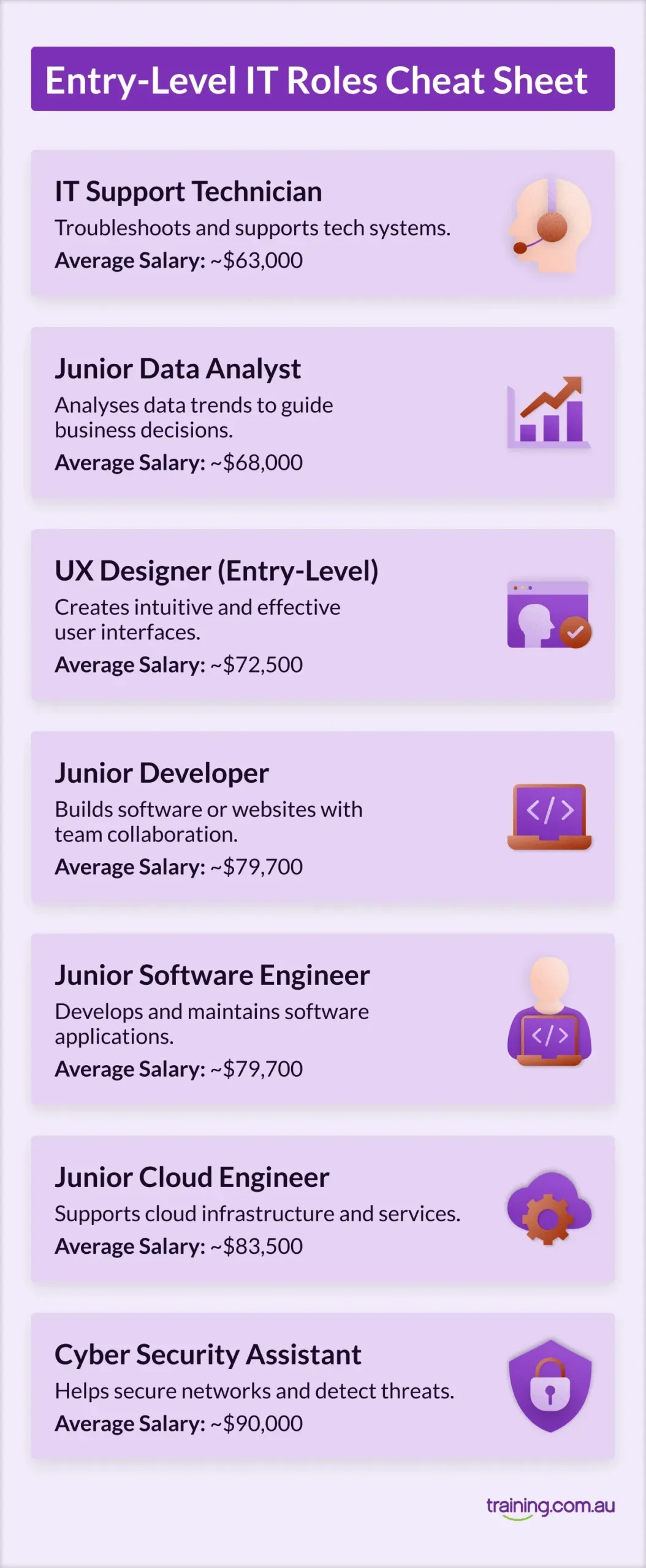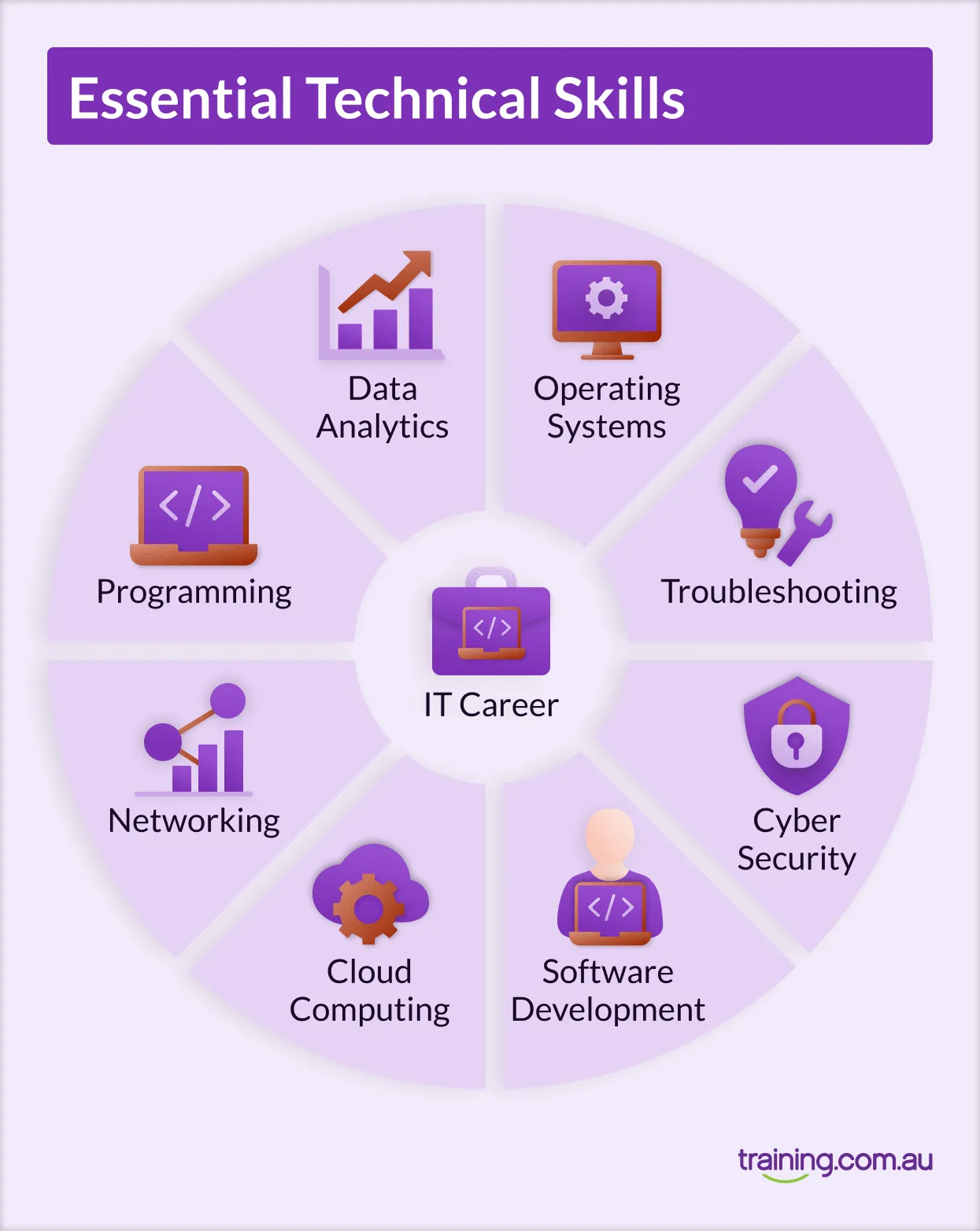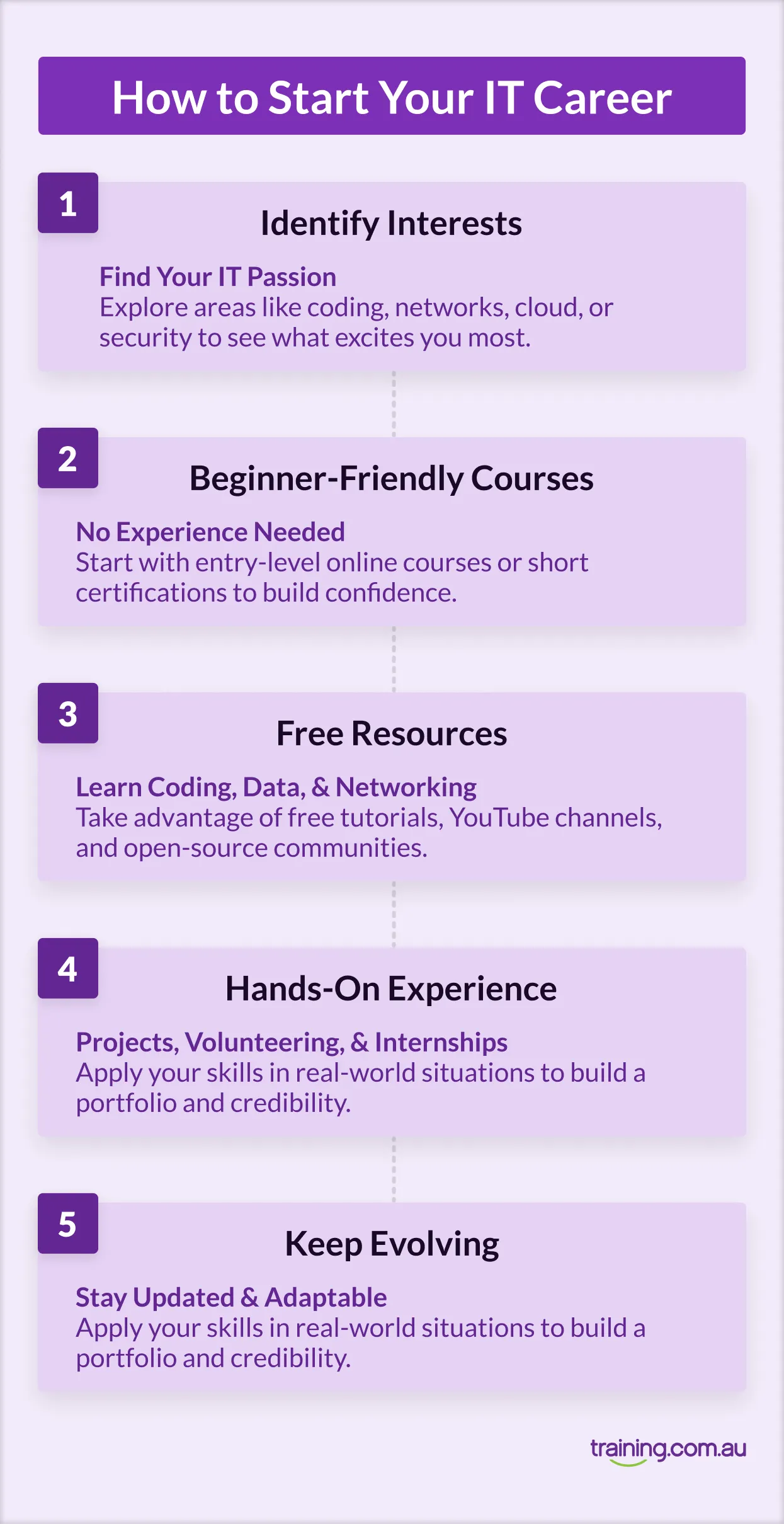How to Launch a Successful IT Career: Skills, Jobs & Courses

Starting a career in IT has never been more achievable or more in demand. With technology driving everything from healthcare and finance to entertainment and education, IT professionals are the backbone of modern life.
And the best part? You don’t need a degree or years of experience to begin. All it takes is curiosity, commitment, and the right learning pathway.
Taking the first step toward an IT career is a big step, but with the right preparation and support, you’ll find a clear path. If you’re at the start of your career and exploring your options or you’ve been thinking about pivoting into IT, this guide is for you.
Find out why IT is such an exciting field, what kind of roles are out there, how to get started with minimal experience, and which courses can help you build a strong foundation.
Why choose a career in IT?
Choosing a career in IT means stepping into a future-proof, ever-evolving industry. Here’s why more and more people are turning to IT:
High demand across industries
Almost every company relies on technology. Whether it’s retail, banking, health, or education, IT roles are essential everywhere, with the expected growth in demand for IT professionals projected to continue across all sectors.
Strong earning potential and job security
Many IT roles offer competitive salaries with fast progression. IT professionals can expect a higher average salary and pay compared to many other industries, making compensation a key factor for those considering a career change. Once you’re in, there’s significant room for advancement.
Flexible and dynamic work options
Remote work is common in IT, and there’s a huge variety of specialisations, so you can pivot as your interests evolve.
What roles are available in IT?
IT careers come in many shapes and sizes. While coding is a common path, it’s not the only option. Understanding and planning your career path in IT is crucial for ensuring long-term growth and adaptability in this ever-evolving industry.
Common entry-level IT roles:
Foundational skills like computer programming, understanding computer systems, operating systems, and networks are essential for many IT roles. Having the right ability is crucial for success in these positions.
IT support technician
Solve tech issues and support users, including troubleshooting computer systems and networks to ensure proper functionality.
Junior developer
Build simple software or websites. The ability to write computer programs, learn to program, and work collaboratively in teams is key for this role. Learn how to become a software developer.
Cyber security assistant
Help protect systems and data, with a focus on securing networks and operating systems against threats.
Junior data analyst
Work with numbers and trends to inform decisions. Data scientists also play a key role in extracting insights from large data sets. The ability to use computer programs for data analysis is essential. Learn how to become a data analyst.
Junior cloud engineer
Design, implement, and manage cloud computing solutions, supporting big data, AI, and machine learning needs across industries
Junior software engineer
Responsible for designing, developing, testing, and maintaining software and computer programs, ensuring their functionality and performance across various sectors.
Specialised and emerging IT careers
The IT industry is a driving force behind digital transformations, and new technologies are constantly reshaping the landscape. As businesses adapt to evolving technology systems, specialised and emerging IT careers are opening up exciting opportunities for professionals who want to develop their expertise and stay ahead of the curve.
Cloud computing
Cloud computing is one of the fastest-growing areas, with cloud engineers responsible for designing, developing, and maintaining cloud-based systems and solutions that power modern businesses. These professionals ensure that technology systems are scalable, secure, and efficient, making them essential in today’s digital world.
Web development
Web development is another high-demand field where web developers focus on creating interactive, user-friendly websites and applications. Their work is crucial for businesses looking to enhance their online presence and deliver seamless experiences to users.
Machine learning
Machine learning is revolutionising the way computers process data and make decisions. Machine learning engineers develop algorithms and models that enable systems to learn from data, driving innovation in industries from finance to healthcare.
AI engineering
AI engineering is an emerging and rapidly growing field within IT that focuses on designing, developing, and deploying artificial intelligence systems. AI engineers work with machine learning models, natural language processing, and computer vision technologies to create intelligent applications that can automate tasks, make predictions, and enhance decision-making.
By focusing on these specialised careers, IT professionals can build valuable skills, work on cutting-edge technologies, and play a key role in creating solutions that shape the future of the industry.

Discover the Trending Tech Jobs in Australia
Curious about which tech careers are booming right now? From cybersecurity experts to data analysts, discover the top roles shaping Australia’s future.
Essential technical skills for an IT career
Technical skills form the foundation of any successful IT career. These are the hands-on abilities and knowledge that enable you to work effectively with information technology systems, software, and hardware. Developing a strong set of technical skills not only enhances your job performance but also increases your employability and career growth potential.
Key technical skills to develop:
Programming
Understanding programming languages such as Python, Java, C++, or JavaScript is crucial for roles like software engineering, web development, and data analysis. Programming skills allow you to create, maintain, and troubleshoot computer programs and applications.
Operating systems
Familiarity with various operating systems, including Windows, Linux, and macOS, helps you manage and support diverse technology environments.
Networking
Knowledge of network protocols, configurations, and security is essential for roles like network engineering and IT support. This includes understanding how data moves across systems and how to protect it.
Cloud computing
Skills in cloud platforms such as AWS, Microsoft Azure, and Google Cloud are increasingly in demand. Cloud engineers design and manage scalable, secure cloud-based solutions that support modern business operations.
Cyber security
Protecting information systems from threats requires expertise in security protocols, threat detection, and risk management. Cyber security skills are vital across many IT roles to safeguard data and maintain system integrity.
Data analytics and machine learning
The ability to analyse large datasets and build predictive models is important for data scientists and machine learning engineers. These skills help organisations make informed business decisions and innovate using artificial intelligence.
Software development
Understanding the stages of software development, from planning to deployment and maintenance, is critical for software engineers and project managers to deliver high-quality technology solutions.
Troubleshooting and problem-solving
Being able to diagnose and resolve technical issues quickly ensures minimal disruption to business operations and enhances user satisfaction.
Soft skills that help you succeed:
Problem-solving
Approach challenges logically and creatively, finding effective solutions in complex situations. This skill is essential in troubleshooting technology systems and adapting to new software or hardware issues.
Curiosity
Stay eager to learn and explore emerging technologies, industry trends, and innovative tools. A curious mindset helps you stay ahead in the fast-evolving IT world and fuels continuous personal and professional growth.
Communication & teamwork
Collaborate effectively with others, whether working within IT teams or interacting with non-technical stakeholders. Clear communication ensures smooth project delivery and helps bridge the gap between technical and business teams.
Adaptability
The IT sector is constantly changing, so being flexible and open to learning new skills or taking on different roles is crucial for long-term success.
Time management
Balancing multiple projects, deadlines, and learning opportunities requires strong organisational skills and the ability to prioritise tasks efficiently.
Attention to detail
Precision matters in coding, system configuration, and security protocols. A keen eye for detail helps prevent errors and maintain high-quality work.
Customer service orientation
Many IT roles involve supporting users or clients. Being patient, empathetic, and responsive improves user satisfaction and builds trust.
These soft skills complement your technical knowledge and are often the driving force behind career advancement and effective collaboration in the IT industry. Developing them alongside your technical skills will give you a well-rounded foundation for a successful IT career.
How to start your IT career: 5 easy steps
Step 1: Identify your interests
Which IT fields are you interested in? Are you excited by cybersecurity or programming? Do you love working with data? Maybe design and user experience are more your thing. Knowing where your interests lie will help guide your course selection.
Step 2: Explore beginner-friendly courses
Look for courses that are designed for career starters with no experience required. Many Vocational Education (VET) or TAFE courses, such as the Certificate III in Information Technology and Certificate IV in Information Technology, don’t have any entry requirements and can get you a foot in the door in the IT industry.
Step 3: Learn from free resources
Free platforms like YouTube, W3Schools and freeCodeCamp offer introductory lessons in coding, data, networking, and more.
Step 4: Get hands-on experience
Create your own projects, volunteer, or seek internships to build practical skills. Your portfolio matters just as much as your qualifications.
Step 5: Keep evolving
Stay up to date with new tools, languages, and best practices. IT is constantly changing, so your learning journey never really ends.
Recommended courses to kickstart your IT career
The course pathway you choose depends on what you’re interested in; however, there are plenty of education pathways available for wherever you are in your IT career journey. Here are some popular study options that offer the flexibility and practical focus new IT professionals need:
Certificate III in Information Technology
The Certificate III in Information Technology is a foundational course designed for those starting their IT career. It provides essential knowledge and practical skills in areas such as computer systems, networking, programming, and cyber security. This course prepares you for entry-level roles in the IT sector by offering hands-on experience and a broad understanding of technology systems, making it an excellent stepping stone for further specialisation or employment.
Certificate IV in Information Technology
The Certificate IV in Information Technology builds on foundational knowledge to prepare you for more advanced roles within the IT sector. This course covers a wider range of topics, including network management, systems analysis, programming, and cyber security strategies. It provides practical skills and a deeper understanding of technology systems, enabling them to take on responsibilities such as IT support, network administration, or junior developer roles.
Diploma of Information Technology
The Diploma of Information Technology is an advanced qualification designed for those who want to deepen their expertise and take on more complex roles within the IT sector. Building on foundational knowledge from Certificate III and IV courses, this diploma covers a wide range of topics, including advanced networking, systems analysis, software development, project management, and cybersecurity strategies.
The diploma also emphasises the development of critical soft skills like problem-solving, communication, and teamwork, which are essential for collaborating effectively in IT teams and aligning technology initiatives with business goals.
IT certifications
IT certifications are professional credentials that validate your skills and knowledge in specific areas of information technology. They are widely recognised by employers and can enhance your resume, improve job prospects, and often lead to higher salaries. Certifications demonstrate your commitment to the field and your ability to stay updated with industry standards.
Some popular IT certifications include:
- CompTIA A+ – Ideal for beginners, this certification covers foundational IT skills such as hardware, software, troubleshooting, and basic networking.
- Cisco Certified Network Associate (CCNA) – Focuses on networking fundamentals, including routing, switching, and network security, making it valuable for aspiring network engineers.
- ITIL Foundation – A globally recognised certification that helps professionals understand how to align IT services with business strategies, improve service delivery, and manage IT operations effectively.
These certifications provide a solid base for entry-level roles and can be stepping stones toward more advanced IT career paths.

Ready to Level Up Your IT Career?
Certifications don’t replace experience, but they do open doors. The right certification can show you’ve got current, job-ready skills.
Study methods and flexibility in IT education
One of the great advantages of pursuing an IT career is the wide range of study methods and flexible learning options available. Whether you prefer self-paced learning, structured courses, or hands-on experience, there’s a pathway to suit your lifestyle and learning preferences.
Online learning
Online courses have revolutionised IT education, making it accessible to anyone with an internet connection. Platforms offer everything from short tutorials to comprehensive certifications, allowing you to learn programming, cloud computing, cybersecurity, and more from the comfort of your home. Many online courses are self-paced, giving you the freedom to study when it suits you best.
Vocational and TAFE Courses
Vocational Education and Training (VET) and TAFE courses provide structured, nationally recognised qualifications with a practical focus. These courses often combine online learning with classroom sessions or workshops, giving you hands-on experience alongside theoretical knowledge. They are designed to fit around your schedule, with part-time and full-time options available.
Bootcamps and intensive programs
For those eager to accelerate their learning, coding bootcamps and intensive IT programs offer immersive, fast-track training. These are typically short-term, high-intensity courses that focus on specific skills like web development or software engineering. Bootcamps often include project-based learning and real-world scenarios to prepare you for entry-level roles quickly.
Balancing study with life
Flexibility is key in IT education. Many courses offer evening or weekend classes, part-time study options, and remote learning to accommodate work, family, or other commitments. This flexibility ensures you can progress at your own pace without sacrificing other important aspects of your life.
By choosing the study method that aligns with your goals and lifestyle, you can build the skills and knowledge needed to thrive in the dynamic IT sector while maintaining balance and motivation.
Do you need a degree to work in IT?
No, you don’t need a degree to work in IT. While a traditional degree can be valuable, it’s far from essential in today’s IT landscape. Many employers care more about practical skills and proof that you can do the job.
If you’re considering alternative pathways into IT, it’s a good idea to seek career advice to help you align your skills with current industry needs and future job market trends.
Alternatives to a degree:
- Nationally recognised VET courses – Learn by doing, build a portfolio, and gain practical experience with real-world program development.
- Short courses and certifications – Quick, targeted learning.
- Micro-credentials – Bite-sized, stackable skills with real-world relevance.
Final tips for success
Building a career in IT is a journey. Here’s how to make the most of it:
Be patient and persistent
It takes time to learn the ropes, but momentum builds quickly once you start.
Network with others
Join online communities, follow IT professionals on LinkedIn, and attend events to learn from others and open doors.
Stay curious
Keep exploring new tools, technologies, and courses. The IT field rewards those who stay engaged and adaptable.
Take the first step towards your IT career today
An IT career is within reach, no matter if you’re starting from scratch or switching paths. The key is to start small, keep learning, and focus on gaining practical skills. With determination and the right support, your IT future is just around the corner.
Browse Results
Diploma of Counselling
There is a growing need for people who can offer support services to adults and teenagers who may need support and guidance. If you have the desire to help people lead a happier life to reach their full potential, a career as a professional Counsellor...

Diploma of Nursing
Build a meaningful career that makes a difference with the HLT54121 Diploma of Nursing. This nationally recognised qualification provides the essential skills, knowledge, and practical training needed to become a qualified Enrolled Nurse in Australia....


Graduate Diploma in Management
The Graduate Diploma in Management is an online postgraduate qualification that is ideal for busy senior managers, with a potential entry pathway through any of our Graduate Certificates and study that is highly supported, fits into your schedule, and...

Graduate Certificate in Management
The Graduate Certificate in Management is an online postgraduate qualification that is designed for newer and ambitious professionals, with entry possible through management experience alone and a study structure that easily accommodates full-time work...

Certificate III in Community Services (WA Only)
The Certificate III in Community Services is perfect for entry level community services workers who support individuals through the provision of person-centred services. Work may include day-to-day support of individuals in community settings or suppor...

Bachelor of Health Science (Clinical Nutrition)
Clinical nutritionists integrate traditional food wisdom and current scientific evidence to motivate individuals and communities to eat well and live healthier lives. The Bachelor of Health Science (Clinical Nutrition) is supported by a strong underpin...

Bachelor of Health Science (Naturopathy)
Naturopathy is a whole medical system combining theory (philosophy and principles) and practise that uses an array of natural therapies to support healing and maintain health. Naturopaths aim to treat the underlying causes of illness and disease. The c...

Certificate III in Community Services (Perth Only)
Are you a natural when it comes to providing guidance to people? Would you like to kick start a career in Community Services? The Certificate III in Community Services (CHC32015) is the perfect entry-level qualification for prospective Community Servic...
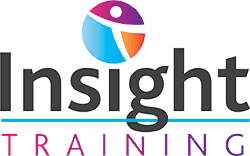
Certificate III in Individual Support (Ageing OR Disability) (Perth Only)
If you have a passion for helping those most in need, this qualification is one way you can utilise your knowledge for the benefit of others. Package the Certificate III in Individual Support (Ageing or Disability) (CHC33021) to save time and gain know...

Certificate lll in Early Childhood Education & Care (Perth Only)
If you love working with children and want to learn more about providing quality education and care in a range of environments, this course is for you. The Certificate lll in Early Childhood Education and Care (CHC30121) can provide you with an entry-l...

Certificate III in Individual Support (Disability) (SA Only)
The Certificate III in Individual Support (Disability) is designed to equip you with the practical skills and knowledge to support people living with disability in a variety of care settings. With a focus on person-centred support, you’ll learn how to...


Certificate III in Non-Emergency Patient Transport (VIC Only)
Our Promise We are confident in the delivery of our training. On successful completion of the course, graduates will be guaranteed a telephone interview for vacant Patient Transport Officer positions in the Non-Emergency Patient Transport division. So...
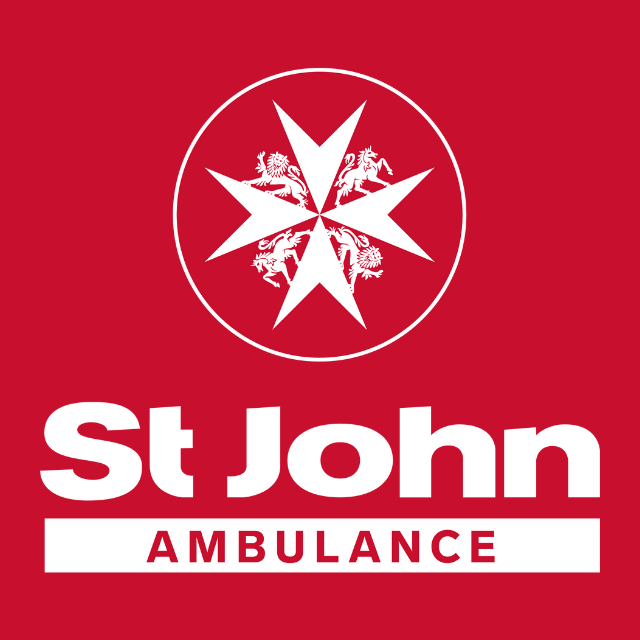
Diploma of Community Services (Perth Only)
The Diploma of Community Services qualification reflects the roles of community services, case management and social housing workers involved in the managing, co-ordinating and/or delivering of person-centred services to individuals, groups and communi...

Certificate IV in Business (Perth Only)
This qualification is suited to those working as administrators and project officers. In this role, individuals use well-developed skills and a broad knowledge base to apply solutions to a defined range of unpredictable problems and analyse information...

Certificate III in Process Manufacturing (Perth Only)
The Certificate III in Process Manufacturing is designed for those working or looking to work in production, warehousing, or factory roles. This hands-on course equips you with the practical skills needed to operate machinery, follow safety procedures,...

Certificate III in School-Based Education Support (Perth Only)
Are you interested in becoming a teacher’s aide? Work with teachers to create a comfortable and supportive environment for children’s learning. You will ensure lessons run smoothly while also developing the student’s literacy, numeracy and resear...

Certificate III in Allied Health Assistance (Perth Only)
A Certificate III in Allied Health is your entrance into the world of health services! This course will teach you to support workers in a range of fields such as audiology to social work. You will use your qualification to gain an entry-level job in ei...

Certificate III in Individual Support (Perth Only)
This qualification is for those who want to work in the community or in a residential setting, following a customised plan to give person-centred assistance to individuals who may need it due to ageing, disability or other circumstances. Work involves...

Certificate III in Allied Health Assistance (Perth Only)
Are you interested in entering the health services industry? This nationally recognised qualification will allow you to enter into one of the most rewarding and enjoyable careers! When studying this course, you will gain knowledge in a range of fields...

Bachelor of Health Science (Acupuncture Therapies)
Acupuncture is a branch of Chinese Medicine that stimulates specific points on the body to regulate the flow of Qi (vital energy) to restore health and balance the functions of the body, mind and spirit. Acupuncture therapies combines Chinese medicine...

